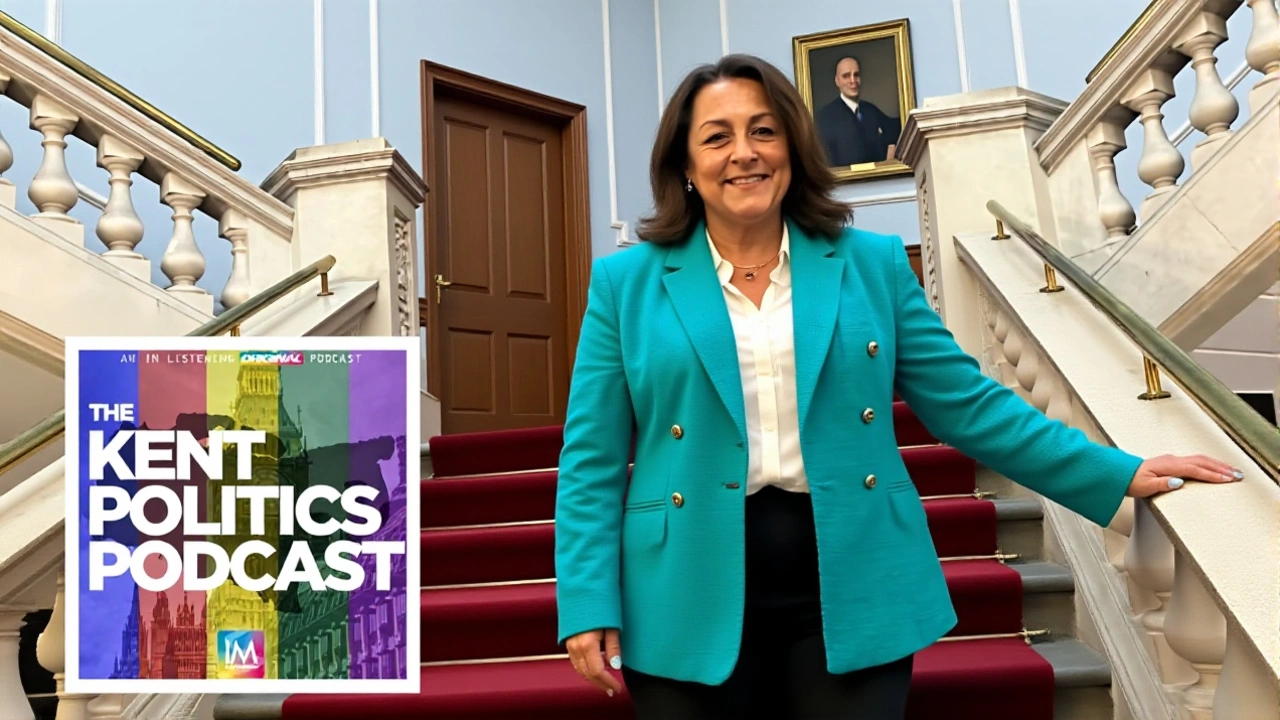When Linden Kemkaran, leader of Reform UK at Kent County Council, was caught on a leaked video swearing at Councillor Paul Thomas, the Liberal Democrat opposition declared her position “untenable,” and a Reform backbencher began gathering signatures for a vote of no confidence that could upend the party’s flagship authority.
Background: Reform UK’s meteoric rise in Kent
In May 2024, Reform UK swept the Kent County Council elections, winning 57 of the 81 seats – a landslide that gave the party control of what officials call the "biggest local council in the country" by seat count. The victory was marketed as a proof‑of‑concept for the party’s ambition to run large‑scale authorities, a narrative that still echoes in internal briefing papers.
Since taking the helm, Kemkaran has overseen a cabinet‑style governance model where each member drives policy, budget guidance and performance monitoring. That structure was supposed to bring strategic clarity, but it also concentrates decision‑making power in a small group – a fact that opponents have seized on ever since the scandal broke.
The leaked video and its fallout
The footage, first published by The Guardian in early 2025, shows Kemkaran in a virtual Reform UK councillors’ meeting. She raises her voice and, in a moment captured on screen, tells Thomas she expects members to "f***ing suck it up" regarding her handling of the council’s reorganisation plan. The clip quickly went viral on social media, prompting outrage from both sides of the aisle.
In response, Kemkaran issued a terse statement: "The potential implication that I have acted in a misogynistic way is one I find ludicrous. I would welcome some clarification from you on this matter." The comment, which lacked a direct address, only fueled speculation about who – if anyone – demanded the clarification.
Signature drive and procedural hurdles
Under KCC’s standing orders, a formal vote of no confidence can be called once a backbencher secures signatures from at least one‑third of the council’s members – roughly 27 councillors. An unnamed Reform backbencher told KentOnline they are "going to try and get the signatures I need to call a vote of no confidence and then I can voice the things that need to be said." The exact timetable remains unclear, but insiders say the drive could be completed before the council’s next quarterly meeting in late March.
Should the motion pass, Kemkaran would be forced to step down, triggering a leadership contest within Reform UK’s Kent group. Such a scenario would be a major blow to the party’s narrative that it can govern large authorities without stumbling.
Devolution dreams derailed
Meanwhile, the controversy unfolds against a backdrop of stalled devolution ambitions. On 9 January 2025, the KCC cabinet voted to pursue a combined authority for Kent and Medway, complete with an elected mayor. The plan was pitched to the central government as a way to unlock additional funding and strategic coordination.
However, on 5 February 2025 the Department for Levelling Up announced that Kent and Medway had not been selected for the Devolution Priority Programme (DPP). Minister of State for Local Government and English Devolution Jim McMahon explained on 30 January that the decision stemmed from "concerns about the size of the population disparity between the two proposed constituent members of your proposed Kent and Medway Combined County Authority and the consequential impact on its governance." The rejection dealt a fresh wound to Kemkaran’s agenda, which had hinged on delivering a mayoral model before the next local election cycle.
The failure of the DPP bid has reignited debate over whether a combined authority makes sense for a region where Kent’s population (≈1.8 million) dwarfs Medway’s (≈280,000). Critics argue the imbalance would give Kent disproportionate influence, while supporters claim economies of scale would benefit both areas.
Reactions from across the council chamber
Members of the Liberal Democrat opposition have been unrelenting. In a council session on 12 March, their spokesperson declared Kemkaran’s conduct "unfit for the leadership of the county’s biggest authority" and called the video evidence “a clear breach of the council’s code of conduct.”
Reform UK insiders, meanwhile, are split. Some senior figures argue that the backbencher’s move is a calculated power play designed to pressure Kemkaran into softening her stance on the devolution plan. Others warn that a leadership tussle could derail the party’s broader national strategy, which relies on showcasing Kent as a model for future parliamentary wins.
Local residents have expressed mixed feelings. A small business owner in Maidstone told us, "I’m worried about the council’s focus. If they’re busy fighting inside, who’s looking after our roads and schools?" By contrast, a university lecturer in Canterbury praised Kemkaran’s “straight‑talk” style, saying, "She’s not afraid to make tough calls, even if it ruffles feathers. That’s leadership we need."

Impact assessment and expert analysis
Political analyst Dr. Hannah Patel of the University of Kent notes that the episode highlights the fragility of party‑led local governance experiments. "When a party uses a single authority as a showcase, any personal scandal becomes a proxy battle over the whole model," she said. "The outcome of the no‑confidence vote will signal whether Reform UK can weather internal dissent while pursuing ambitious reforms."
From a fiscal perspective, the council’s budget office warned that a leadership change could delay the rollout of the 2025‑26 spending plan, potentially affecting £150 million earmarked for school upgrades and road maintenance.
What’s next? Timeline of key dates
- 9 January 2025 – KCC cabinet approves devolution proposal.
- 30 January 2025 – Jim McMahon outlines government concerns.
- 5 February 2025 – Central government rejects Kent‑Medway DPP bid.
- Early March 2025 – Leaked video published by The Guardian.
- Mid‑March 2025 – Signature drive by Reform backbencher intensifies.
- Late March 2025 – Potential council meeting to vote on no‑confidence motion.
Should the vote proceed and pass, a new leadership contest would be called within weeks, putting the council’s strategic direction in limbo until a successor is installed. Observers will be watching closely for any sign that the party recalibrates its approach to local governance.
Historical context: Kent’s place in UK local politics
Kent County Council, established in 1889, has long been a bellwether for national policy experiments, from early adoption of CCTV surveillance in the 1990s to its role in piloting integrated transport schemes. The council’s size – covering 1,447 sq km and serving over 1.8 million residents – makes it a natural testing ground for reforms.
The 2024 election was the first time a single party (Reform UK) secured a decisive majority in the council’s modern era, breaking a decades‑long pattern of coalition rule between the Conservatives and Liberal Democrats. That political shift set the stage for the current clash between party ambition and local accountability.
Frequently Asked Questions
How could a vote of no confidence affect local services in Kent?
If the motion succeeds, the council would need to appoint an interim leader while a leadership election is organised. That transition period could stall the implementation of the £150 million spending plan for schools and roads, potentially delaying projects that affect daily commuters and families across the county.
What does the failed devolution bid mean for Kent’s future?
The rejection of the Devolution Priority Programme means Kent and Medway will not receive the additional funding and powers tied to a combined authority. Without the mayoral model, any large‑scale strategic planning will continue under the existing council structure, limiting the scope for regional infrastructure projects.
Who can trigger a vote of no confidence at Kent County Council?
Any councillor can propose the motion, but it only proceeds once at least one‑third of the 81 elected members (27 councillors) sign a petition. The backbench Reform member currently driving the effort claims to be close to that threshold.
What are the Liberal Democrats’ main criticisms of Kemkaran’s leadership?
They argue her confrontational style breaches the council’s code of conduct and that her handling of the devolution agenda shows a lack of strategic vision. The opposition also points to the leaked video as evidence of a toxic internal culture.
What timeline should residents expect for a resolution?
If the signature drive succeeds, the council is likely to schedule a vote by late March. A leadership contest could take another four to six weeks, meaning the county may be without a permanent leader well into the spring.
